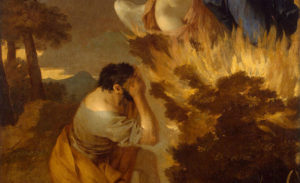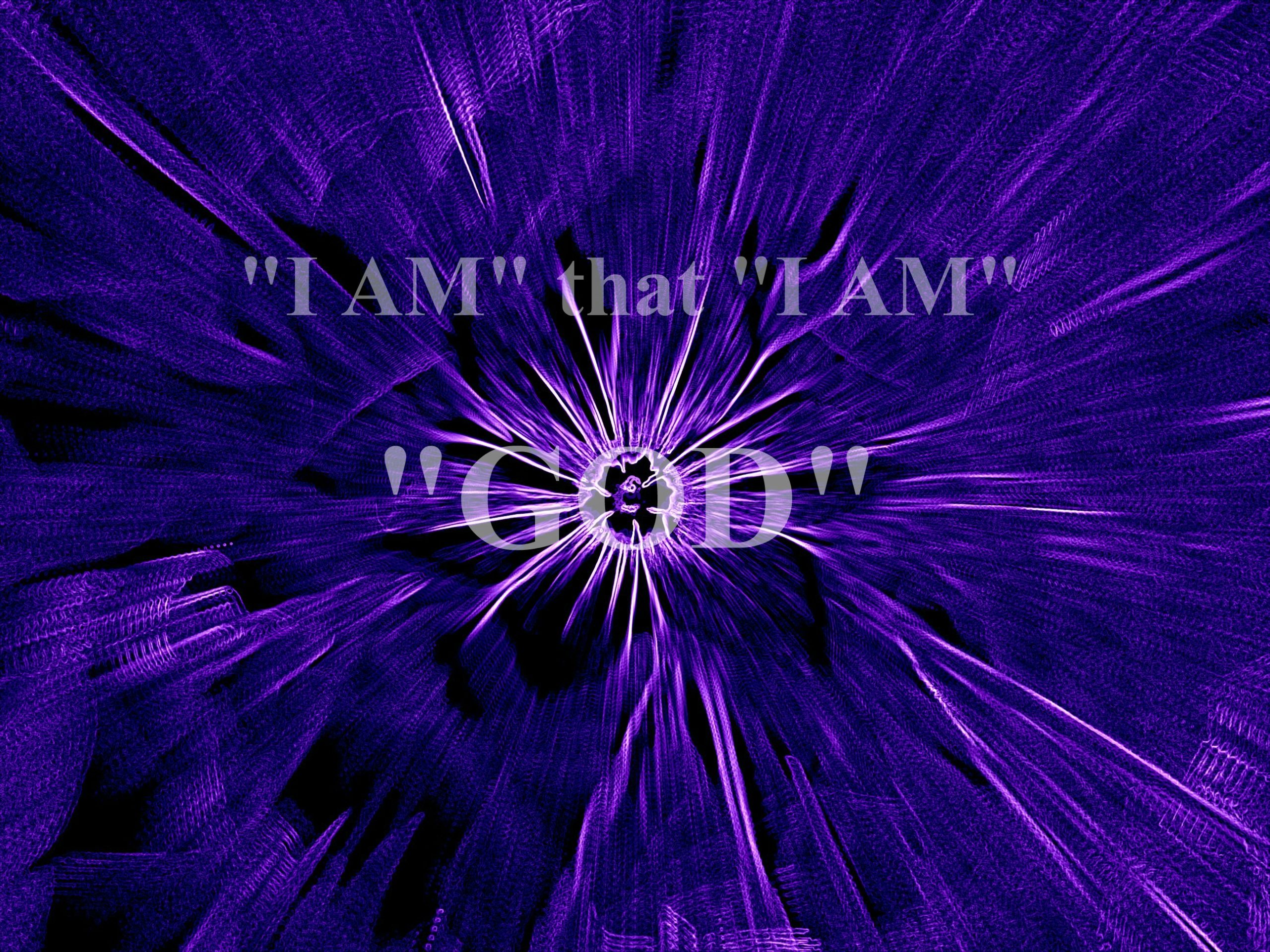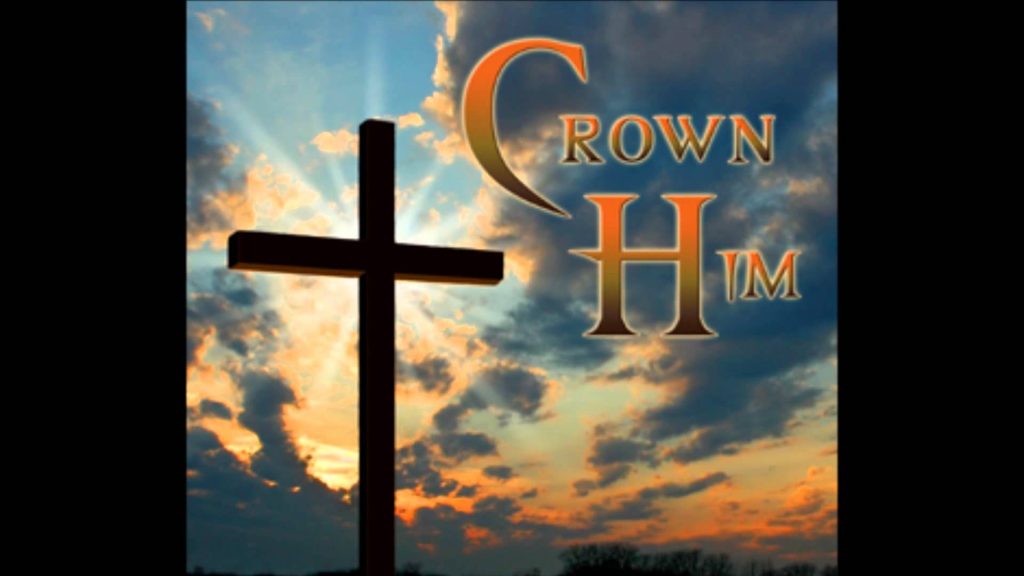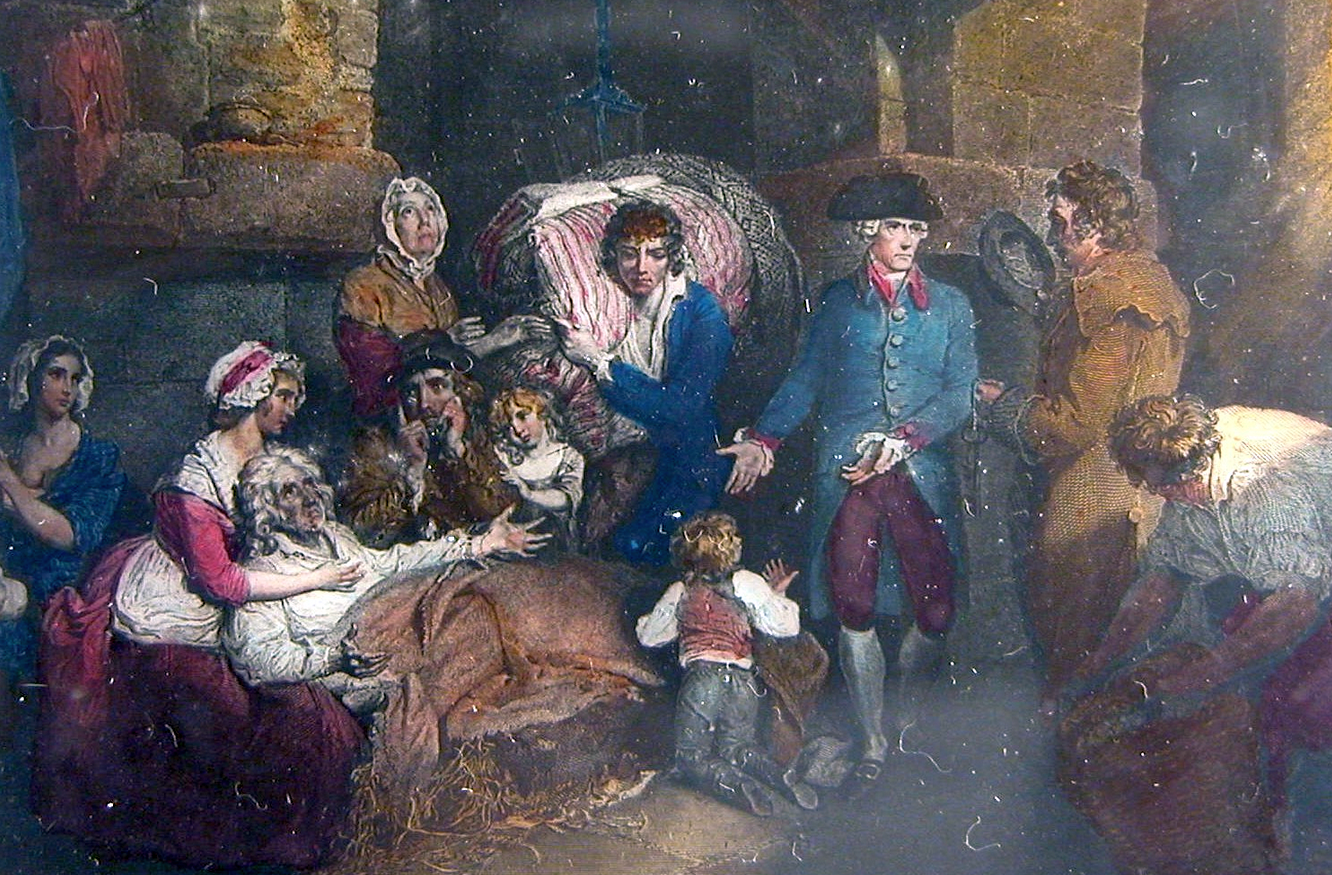Editor’s Note: Henry Law (1797-1884) served as Dean of Gloucester from 1862 until his death. He was most wellknown for his work in studying the typology of Christ in the first five books of the Old Testament.
“I am that I am” Exodus 3:14
The believer is called to wayfaring and warfaring struggles. He has to bear a daily cross and to fight a daily fight. But in every hour of need a sure support is near. Behold Moses. The ground that he must tread is very slippery. The hill of his difficulties is very steep. A foe opposes every step. But a staff and a sword are provided for him in the name of his guiding and protecting Lord. “I am that I am.” On this He can lean the whole burden of his cares, and fears, and pains. By this he can scatter kings as dust. This stay is still the same, ever mighty, ever near. The feeblest pilgrim may grasp it by the hand of faith. And whosoever grasps it is “as Mount Zion, which cannot be removed, but abides forever.” “I am that I am.”
 Such is the voice from the burning bush. The Speaker, then, is hid in no mask of mystery. It is the Angel of the everlasting Covenant. It is the great Redeemer. He would establish His people on the firm rock of comfort. Therefore with trumpet-tongue He thus assures them that all the majesty, all the supremacy, all the glory of absolute and essential Deity, are His inherent right. O my soul, into what a speck must poor man dwindle before such greatness! The limits of the mind cannot scan it. The arms of the heart cannot embrace it. Words are mere skeletons before it. Intellect would sincerely on eagle’s wing fly around the ever-widening circle. But vain is the effort. Its height is on heaven’s summit.
Such is the voice from the burning bush. The Speaker, then, is hid in no mask of mystery. It is the Angel of the everlasting Covenant. It is the great Redeemer. He would establish His people on the firm rock of comfort. Therefore with trumpet-tongue He thus assures them that all the majesty, all the supremacy, all the glory of absolute and essential Deity, are His inherent right. O my soul, into what a speck must poor man dwindle before such greatness! The limits of the mind cannot scan it. The arms of the heart cannot embrace it. Words are mere skeletons before it. Intellect would sincerely on eagle’s wing fly around the ever-widening circle. But vain is the effort. Its height is on heaven’s summit.
What mortal arm can reach it? It is as space which has no bounds. What human line can measure it? Our mortal eyes pierce not unlimited expanse. Our scales weigh not the mountains. Our vessels measure not the ocean’s depths. So our faculties are too short to probe the immensities of God. To grasp divine essence requires divine largeness. “I AM THAT I AM” alone can read the volume of that title. Shall we then repine? What! Repine because our God is so great? Where is the subject who frets because he cannot count his prince’s treasures? Let us rather bow our heads in pious adoration.
Let us rather give thanks that a mine is open in which the very dust is gold. Let us rather humble ourselves, that we are so slow and careless to gather up the manna of rich truth which falls at the tent-door. Let us rather pray the Spirit to illumine more clearly the written page. Let us rather long for the day when every cloud which veils our God shall brighten into perfect light; and when His people “shall be like Him, for they shall see Him as He is.” Come then, and with such loving teachableness let us take our seat beside this sea of truth, and strive with reverence to touch the spray that sparkles on the shore. “I AM THAT I AM.” Here the first sound is eternity. Jesus, as God, He puts on eternity as his robe. He knows no past. He knows no future. He lives unmoved in one unmoving present.
He stretches through all the ages which are gone and which are yet to come. His only bounds are immeasurable boundlessness. Before time was born, He is “I AM THAT I AM.” When time shall have expired, He still is “I AM THAT I AM.” If there had been the moment when His being dawned, His name would be, “I am what I was not.” If there could be a moment when His being must have end, His name would be, “I am what I shall not be.” But He is, “I AM THAT I AM.” Thus He treads first and last beneath his feet. He sits on the unbroken circumference of existence, as He who ever was, and ever is, and ever shall be. Let thought fly back, until in weariness it faints: let it look onward until all vision fail; it ever finds Him the same “I AM.”
Reader, look down now from this astounding glory and fix your eye on Bethlehem’s manger. A lowly Babe lies in the lowly cradle of a lowly town, the offspring of a lowly mother. Look again. That child is the eternal “I AM.” He whose Deity never had birth, is born “the woman’s Seed.” He, whom no infinitudes can hold, is contained within infant’s age, and infant’s form. He, who never began to be, as God, here begins to be, as man. And can it be, that the great “I AM THAT I AM” shrinks into our flesh, and is little upon our earth, as one newborn of yesterday? It is so. The Lord promised it. Prophets foretold it. Types prefigured it. An angel announces it. Heaven rings with rapture at it. Faith sees it. The redeemed rejoice in it. But why is this wonder of wonders? Why is eternity’s Lord a child of time?
He thus stoops, that He may save poor wretched sinners such as we are. Could He not by His will or by His word? Ah! No. He willed, and all things were. He speaks, and all obey. But He must die, as man, that a lost soul may live. To rescue from one stain of sin, the Eternal must take the sinner’s place, and bear sin’s curse and pay sin’s debt, and suffer sin’s penalty, and wash out sin’s filth, and atone for sin’s malignity. “I AM THAT I AM” alone could do this. “I AM THAT I AM” alone has done it. What self-denial, what self-abasement, what self-emptying is here! Surely, royalty in rags, angels in cells, is no descent compared to Deity in flesh! But mighty love moves Jesus to despise all shame, and to lie low in misery’s lowest mire. Through ages past His “delights were with the sons of men.” Prov. 8.31.
Eternity to come is but a void, unless his people share His glory. Therefore He humbles Himself to earth, that specks of earth may rise to heaven’s immortality. Believer, you joy in prospect of thus living with Him forever. But wherefore is there full rapture in the thought? Do not you feel that the crowning ecstasy is in this? Eternity will afford you time to gaze with steady look on a Savior’s glories, to sing with unwearied hymn a Savior’s praise, to bless with perpetual blessing a Savior’s name, and to learn with ever-expanding knowledge a Savior’s worth. There is another note in this loud chorus of truth, which is especial sweetness to the believer’s ear.
It tells melodiously that Jesus cannot change. He is as constant as He is great. As surely as He ever lives, so surly He ever lives the same. He is one expanse of never-varying oneness. He sits on the calm throne of eternal serenity. Change is the defect of things below: for things below are all defective. Immutability reigns above: for immutability is perfection’s essence. Our brightest morn often ends in storm. Summer’s radiance gives place to winter’s gloom. The smiling flower soon lies withered. The babbling brook is soon a parched-up channel. The friend who smiled, smiles no more friendly welcomes.
Bereavement weeps where once the family beamed with domestic joy. Gardens wither into deserts. Babylons crumble into unsightly ruins. On all things a sad inscription writes “fleeting-transient-vanishing.” Time flaps a ceaseless wing, and from the wings decay and death drop down. “I AM THAT I AM” sits high above all this. He is “the same yesterday, and today, and forever.” The unchangeableness of Jesus is the unchangeableness of His attributes. Each shines brightly in this bright mirror. But a rapid glance at His love and power must suffice. His love is in perpetual bloom. It is always in summer-tide. The roots are deeply buried in Himself; therefore the branches cannot fade. Believer, drink hourly of this cup of joy. Allow not Satan to infuse a poisonous doubt. Christ loved you largely when, in the councils of eternity, He received you into His heart. He loved you truly when, in the fullness of time, He took upon Himself your curse, and drained your hell-deep dues.
He loved you tenderly when He showed you, by the Spirit, His hands and His feet, and whispered to you that you were His. He loves you faithfully while He ceases not to intercede in your behalf, and to scatter blessings on your person and your soul. He will love you intensely in heaven when you are manifested as His purchase and crowned as His bride. To each inquiry-has He loved? Does He love? And will He love? The one reply is, “I AM THAT I AM.” Do not raise the objection, if He thus loves, why am I thus? Why is my path so rugged, and my heart like flint? You will soon know that your bitterest trials and your sorest pains are sure tokens of His love. The father corrects because he loves.
In anxious care the physician deeply probes the wounds. Thus Jesus makes earth hard, that you may long for heaven’s holy rest. He shows you your self-vileness that you may prize His cleansing blood. He allows you to stumble that you may cleave more closely to His side. He makes the world a blank that you may seek all comfort in Himself. If He seems to change, it is that you may change. He hides His face that you may look towards Him. He is silent, that you may cry more loudly. His desertion prevents your desertion.
He saves from real hell, by casting into seeming hell. But love fails not. All His dealings are love’s everflowing, overflowing tide. On each the eye of faith can read, “I AM THAT I AM.” Power goes hand in hand with love. They co-exist and co-endure. It was a mighty voice which said, “Be”-and all things were. It was a mighty hand which framed this so wondrous universe. It is a mighty arm which turns the wheel of providence. This power still is, and ever will be, what it always has been. No age enfeebles, and no use exhausts it. This is the Church’s rock.
The Bible, blazing with its exploits, encourages the “worm Jacob” to “be strong in the Lord, and in the power of His might.” He can still bid the seas of difficulty to recede. He can cause hurricanes and tempests to cease. He can make straight the crooked paths of evil. He can level the mountains of high-towering corruption. He can stop the lion-mouth of persecution. He can quench the scorching flames of every lust. In the face of all Goliaths, He cheers His followers to victory, under the banner of “I AM THAT I AM.”
But perhaps it is your wretched case to live unsprinkled by His saving blood. Will you die thus? What, thus appear before His great white throne? His truth condemns you-and it cannot change. His wrath burns hot against you and it cannot relent. His power has commission to destroy you-and it cannot be withstood. “I AM THAT I AM” becomes an idle fable, if truth and wrath and power war not eternally with sin. And can they war and not prevail? Believer, the eternity and unchangeableness of “I AM THAT I AM” make heaven to be heaven forever.
Sinner, the eternity and unchangeableness of “I AM THAT I AM” make hell to be hell forever. Reader, these thoughts scarce touch the boundary line of the shadow of this glorious name. But surely they show the blessedness of those who, guided by the Spirit, repose beneath the wings of Jesus. “The eternal God is your refuge and underneath are the everlasting arms” Deut. 33:7. “I AM THAT I AM” must perish or must change, before their names can be cast from His heart. Some greater power must arise before they can he plucked from His tight-grasping hand. The bare idea is folly.
Happy flock “I AM THAT I AM” loves them, and they are loved: calls them, and they follow Him: sanctifies them, and they are sanctified: blesses them, and they are blessed: gives them life, and they live: gives them glory, and they are glorified. AMEN!









